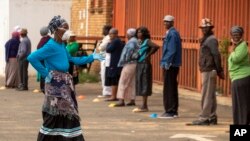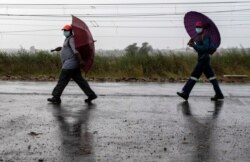Like millions of South Africans, Georgina Maepa is confined at home, as her nation tries to stop the spread of the coronavirus.
But that is cold comfort for her.
Under the rules of the lockdown, the 53-year-old mother of four can’t leave home for her job cleaning other people’s homes for about $80 a month. Like the majority of domestic workers, she doesn’t have a formal contract.
And so, as the nation prepared last month to lock down for 21 days, Maepa’s employers’ words were final: No work, no pay.
“They say they haven’t got money,” Maepa said. “If I want a lot of money, then I must look for another job. I’m just doing piece jobs, because there is no job now. We’re suffering to get another job.”
Labor activist Pinky Mashiane said this scenario is all too common across South Africa, where persistent, deep inequalities have entrenched race and class divisions. The union she leads, United Domestic Workers of South Africa, counts 400 members, including gardeners, nannies and cleaners like Maepa.
Mashiane said she’s been overwhelmed with stories like Maepa’s since the lockdown began on March 26.
“It is a difficult time as we speak, with the domestic workers in South Africa,” she told VOA. “There are those who are sent home by employers who didn’t pay them and didn't give them anything. And they said they mustn't come back to work until employers will call them to come to work. And there are also those that were kept by employers, but without their permission. The employers forced them to stay at work because they say if they go home, they will make them sick.”
Both of those scenarios are illegal, Mashiane said. She maintains that because of the extreme circumstances of the lockdown, employers have a moral obligation — and in many cases, a legal obligation — to continue paying employees, even if they cannot come to work.
But it is unclear how many are doing so. Many workers currently living on razor-thin margins have no recourse, because the nation’s labor courts are closed for the lockdown.
Gardener Joseph Aphane is among the involuntarily locked down. The 50-year-old has retreated home to rural Limpopo province with a fraction of his monthly salary. His boss told him and his eight co-workers that with no money coming in, she couldn’t afford his full monthly salary of just over $160.
“It's not right,” he told VOA. “Not good. Not good. It's not, it's not right at all.”
His employer, garden service owner Letitia Lovelock, said she, too, is in a precarious position. Since her company can’t do business during the lockdown, she has no income. She said she hadn’t considered sending invoices to clients because she assumes they won’t pay them. So, she has drained her resources to keep her employees afloat.
“I have loaned until I cannot loan anymore to pay them to make sure that they have food and money,” she told VOA. “I can't loan anymore, to such a degree that I have got myself into debt. I have stayed employing the nine people that work for me for the simple fact that they have families at home. There isn't work out there. If I don't employ them, they're not going to get work. My staff has been very understanding, and the longest member that's been with me has been with me for 32 years.”
Aphane, who said he has been working for Lovelock for so long that he can’t remember, said he’ll be happy to return to her service when the lockdown ends.
But will he return to the same world he left? Trade union educator and activist Warren McGregor said the issue is not about whether individuals are paying their domestic staff right now, but whether they view domestic work as valuable.
“I would actually compel people to be less concerned about moralizing themselves individually, or at least providing individual moralistic arguments, and rather (ask), Why do we still exist in a society where so much of the work that people do are informalized or so vulnerable?”
He added, “Instead ... let us move towards formalizing domestic work. Let's move towards formalizing gardening, etc. Most importantly, let's push back against the informalization of work, and the casualization, and the precarious-ization of work that is taking place right now.”
Union leader Mashiane agrees. She said the women and men in her union keep South Africa running. Maybe the lockdown, she said, will remind South Africa of their worth.





